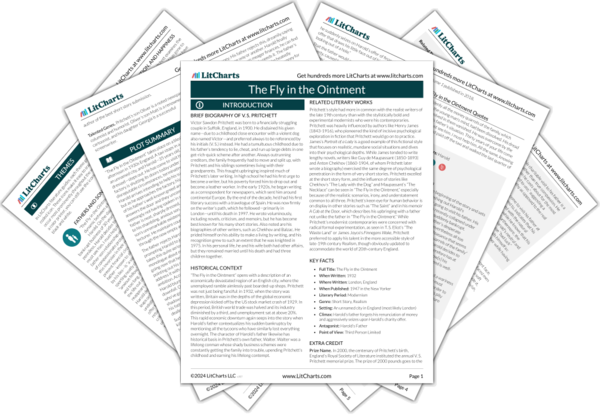“The Fly in the Ointment” explores the complex dynamic between a father and his adult son, Harold. On the day that the father’s suddenly bankrupt business of 30 years is shutting its doors, leaving him penniless, Harold decides to pay him a visit, telling himself, “I must see him. I must help him.” Pritchett thus turns the typical father-son relationship on its head, showing the son in the role of compassionate protector. The story proceeds to reveal that this inversion in their relationship runs deeper than just their present financial circumstances: the 65-year-old father—known to all as a crooked businessman, finally undone by his lies—is “a vigorous, broad man,” excellently dressed and sporting neatly clipped hair, while his 35-year-old son is an “anxious fellow,” “shabby,” stooped, and with hair both balding and too long. It’s as though the narcissistic father has sucked the life out of his son to keep for himself—a pattern that reappears when he takes the only remaining teacup, which Harold deferentially declines, and when, in the end, he greedily leaps on his son’s charitable offer. He “despise[s]” Harold for his undistinguished life as a local lecturer, yet he accepts Harold’s offer to “lean on [him]” both physically and financially. And in return, he mainly lambastes his son for his baldness and criticizes his small-scale professional aspirations. Selfish and ungrateful, the father seems more like a teenager than the father of an adult son.
The story implies that growing up with such an irresponsible father has made Harold “anxious” and unenterprising out of the fear of replicating his brazen father’s mistakes. This, in turn, only earns his father’s further contempt. The two men clearly have not been in contact for some time, but in the father’s dire circumstances, Harold feels he “must help him.” The father, meanwhile, feels that “[t]here’s nothing holding [him] back” from suicide beside his own optimism about escaping to some far-off place like an idyllic beach—not, that is to say, any kind of devotion to his son. The story thus invites readers to consider the ways in which fathers and sons are—and are not—bound by responsibility to support each other, ultimately highlighting the fact that this dynamic is often messy, complex, and counterintuitive.
Fathers and Sons ThemeTracker

Fathers and Sons Quotes in The Fly in the Ointment
Suddenly all the money quarrels of the family, which nagged in the young man’s mind, had been dissolved. His dread of being involved in them vanished. He was overcome by the sadness of his father’s situation. Thirty years of your life come to an end. I must see him. I must help him. All the same, knowing his father, he had paid off the taxi and walked the last quarter of a mile.
The father was well-dressed in an excellent navy-blue suit. He was a vigorous, broad man with a pleased impish smile. The sunburn shone through the clipped white hair of his head and he had the simple, trim, open-air look of a snow man. The son beside him was round-shouldered and shabby, a keen but anxious fellow in need of a hair-cut and going bald.
“I’m all right,” the son said, smiling to hide his irritation. “I’m not worried about anything. I’m just worried about you. This—” he nodded with embarrassment to the dismantled showroom, the office from which even the calendars and wastepaper-basket had gone—“this—” what was the most tactful and sympathetic word to use?—“this is bad luck,” he said. “Bad luck?” said the old man sternly.
A different man was speaking, and even a different face; the son noticed for the first time that like all big-faced men his father had two faces. There was the outer face like a soft warm and careless daub of innocent sealing wax and inside it, as if thumbed there by a seal, was a much smaller one, babyish, shrewd, scared and hard.
“Be careful,” said the son. “Don’t lose your balance.” The old man looked down. Suddenly he looked tired and old, his body began to sag and a look of weakness came on to his face. “Give me a hand, old boy,” the old man said in a shaky voice. He put a heavy hand on his son’s shoulder and the son felt the great helpless weight of his father’s body. “Lean on me.”
“You know where I went wrong? You know where I made my mistake?” The son’s heart started to a panic of embarrassment. For heaven’s sake, he wanted to shout, don’t! Don’t stir up the whole business. Don’t humiliate yourself before me. Don’t start telling the truth. Don’t oblige me to say we know all about it, that we have known for years the mess you’ve been in, that we’ve seen through the plausible stories you’ve spread, that we’ve known the people you’ve swindled.
“Don’t say I want money,” the old man said vehemently. “Don’t say it. When I walk out of this place tonight I’m going to walk into freedom. I am not going to think of money. You never know where it will come from. You may see something. You may meet a man. You never know. Did the children of Israel worry about money? No, they just went out and collected the manna. That’s what I want to do.”
He coloured. He hated to admit his own poverty, he hated to offer charity to his father. He hated to sit there knowing the things he knew about him. He was ashamed to think how he, how they all dreaded having the gregarious, optimistic, extravagant, uncontrollable, disingenuous old man on their hands. The son hated to feel he was being in some peculiar way which he could not understand mean, cowardly and dishonest.











